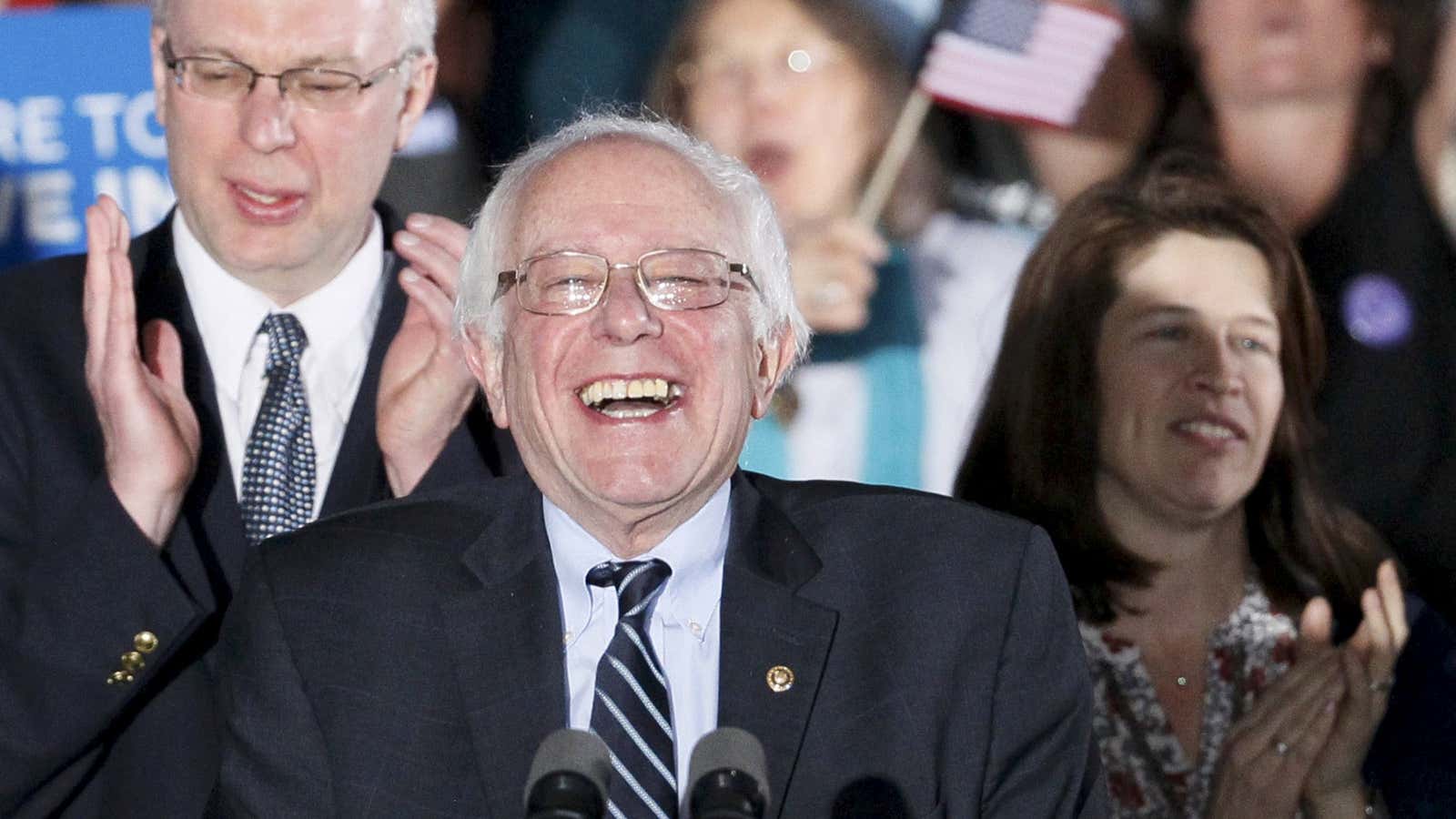Bernie Sanders wasn’t supposed to get this far. Even among his earliest and most ardent supporters, Sanders was a protest candidate—a strategic thorn in the side of the behemoth and barreling Hillary Clinton campaign. That Sanders is doing well in the election is like thrown-together icing on a barely baked cake. The idea that he could actually win the nomination? Can icing have icing on it?
When Sanders talks about how his campaign isn’t about himself but the voters, how his goal isn’t to win but to spark a revolution, that’s not hollow rhetoric. “This is not about me. It’s about you,” Sanders often reminds his supporters. Sure, from the get go in announcing his candidacy, Sanders said he planned to win—as any campaign must insist—but he always tempered those expectations with a broader definition of winning, that of lifting up a set of issues and galvanizing a movement for broad change. “If you try to put together a movement which says, ‘We have got to stand together as a people and say that this Capitol, this beautiful Capitol, our country belongs to all of us and not the billionaire class’ — that is not raising an issue, that is winning elections,” Sanders said in announcing his presidential run in front of Congress last summer. Building the movement, pressing the issues, changing the political debate and the political system as a whole—arguably far more ambitious goals than winning the presidency, and the campaign was just an excuse for this revolutionary agenda. “Bernie Sanders Won’t Win, But His Ideas Might,” was the headline of a piece by Perry Bacon, Jr., when Sanders announced his candidacy. And that was, and still largely is, the conventional wisdom.
It is hard to beat someone who isn’t trying to win.
That’s not to say Sanders doesn’t want to be president, nor that his supporters don’t want him to be, but again, that was never the primary point. Running the race, and making the front-runner move to the left, was the definition of victory. The campaign is a tactic, not an end goal.
This strategy comes from a leader and a team steeped in the thinking, analysis and ambition not of Democratic insider baseball but progressive organizing and social movements. In a sense, Sanders shares this identity with Barack Obama, who was a community organizer early in his career. And yet they deploy this similarity in radically different ways.
While Barack Obama’s 2008 run was a political campaign disguised as a progressive movement, Bernie Sanders’ campaign is a progressive movement disguised as a political campaign. “Change You Can Believe In” was Obama’s slogan. But by and large, voters now aren’t supporting Sanders because they want a candidate they can finally believe in but because they want a fellow activist who shares their desire to deconstruct a political system in which they have almost entirely stopped believing. Obama inspired us with hopefulness. After eight years of unprecedented and unconscionable conservative obstructionism, plus whatever stumblings in governance must be attributed to Obama, that hope is extinguished. Now we want someone who shares our anger.
What makes Sanders’ campaign alluring to voters is also what makes it frustrating to Hillary. Sure his critique of the system and his ideological vision find resonance in part because they speak to what progressive Democrats are troubled by in Hillary’s record and beliefs. But it’s the simple unwillingness to play the political game that makes it so hard to take on Sanders as an opponent. When Sanders repeatedly refuses to talk about Clinton’s emails or Clinton Foundation donations or take the bait on any other smears, it makes Hillary seem even nastier when she or her husband attack Bernie’s character. When Sanders barely prepares for debates let alone combs his hair, it makes Clinton’s polished one-liners and well-prepared moments seem extra establishment. His “Bernie Hair Don’t Care” hyper-authenticity makes anything else look like politics as usual. Which also works to his benefit, since politics as usual is what Sanders is truly trying to defeat.
Sanders has said that whatever happens in the upcoming primary votes, “We are in this to the end.” There are many ways to interpret that. Certainly it suggests he intends to stay in the race, and shape it, through the convention—whatever his vote tally. But just as his campaign can be viewed more broadly, so can this timeline. “If Sanders inspires supporters to delve deeper into Democratic Party politics,” writes Jamelle Bouie in Slate, “then it could change the long term.”
Bernie Sanders could be the Democratic nominee for president. It’s looking more possible every day. But either way, what is clear is that Hillary Clinton and the Democratic establishment cannot defeat Sanders—not his candidacy, per se, but his meaning, the ideas and values and rising movement he represents. As the old protest march chant goes, “The people, united, can never be divided!” And a movement, once seeded, can never be defeated. The Bern will keep burning no matter what.
